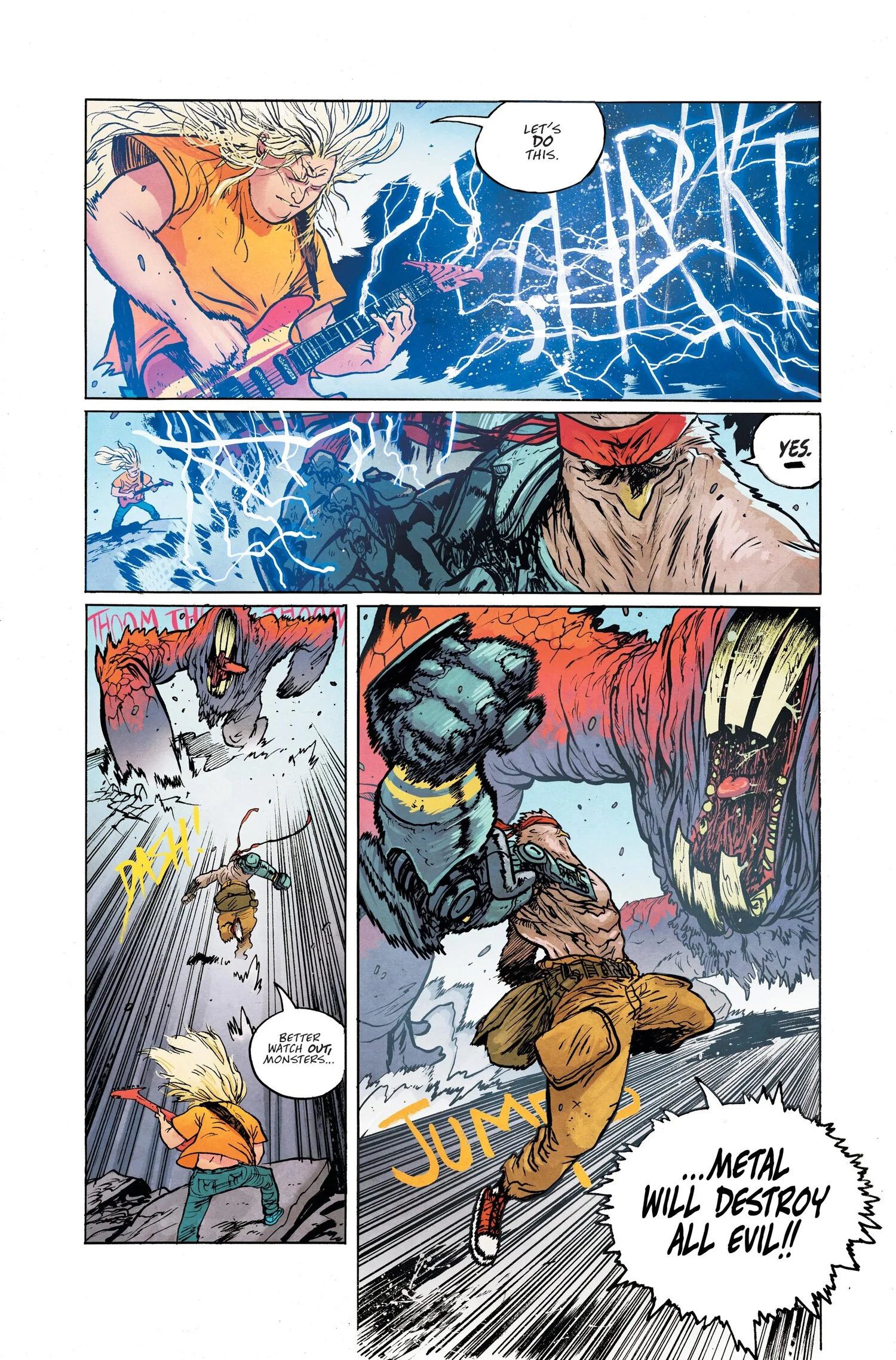What to Read: Murder Falcon
by James Rambo, Comics/Media Expert
Murder Falcon (Issues 1 - 8)
Writer/Artist: Daniel Warren Johnson
Colorist: Mike Spicer
Letterer: Russ Wooton
Publisher: Image Comics
Murder Falcon is a comic whose titular character is an anthropomorphic, cyborg bird man that fights giant monsters. It is also a wonderful example of an absurd, over the top premise that has a core of profound beauty.
Jake, a metalhead whose band Brooticus broke up some time ago, has an otherworldly beast appear in his apartment followed immediately by a being calling himself “Murder Falcon.” MF is here to slay the monster but in order for him to do so, he needs one thing from Jake: TO SHRED. When Jake plays his electric guitar, his new ally is super-charged and able to destroy the creature before him. When MF lays out the impending threat of the monstrous forces of Magnum Khaos and the Veldar it’s clear what Jake has to do: get the band back together.
This was enough for me. I was happy to have a big piece of comic book cake, delicious and fun and going straight to my hips. But Murder Falcon is much more than that. There’s nutritional value to be had in this media like some kind of vegetable-filled baked good. A carrot cake, if you will.
Over the course of the story, we get little glimpses of why the band broke up and like any good slow reveal, each peek at the past shifts the perspective of both the present and specific character dynamics. Among these is the implication of an infamous comics trope that is marvelously subverted later in the story. In my early reading of the comic, it was my one major criticism and Johnson totally fooled me. The backstory is a tragic one and it doesn’t stay in the past, culminating in a reveal that had me in tears, overwhelmed by both the tragedy and the earnestness of a scene.
It’s not fair to try and reference the narrative as surface level because every aspect of the storytelling is working in tandem. The text and subtext are not just harmonious but symbiotic. Johnson has married a cartoon premise to a deep and all too real backstory and each is better for it. This is very clearly a personal story (which is no secret -- Johnson has said as much about how music has helped him through some dark times) and the honesty and exposure from the creator elevates what could have been just a fun comic into a fun comic that is also a piece of art. There’s nothing wrong with the former but the latter is truly something special.
As to the visuals of the comic, Daniel Warren Johnson is an artist in a rarified class. Comics are a static artform but his action pages MOVE. The dynamism of his linework is incredible, focusing on individual objects to create real motion. Multiple times we see MF’s mechanical arm rendered in shakey zig zags and you can feel the wind from his swing as he lays into a monster. His manga-influenced speed lines, hard, sharp diagonals, only further add to that sense of kinetic action. But it’s not all high-octane action pieces. Johnson is able to render quiet conversation with the same ease as a raucous fight. In a story that has quite a few of both, this ability is welcome and necessary.
Similarly, Mike Spicer’s color palette is wide and varied, with washed-out muted blues used to show the flashbacks and bright, vibrant reds and oranges highlighting the not-of-this-world nature of Khaos and the Veldar. As the comic races to the finale, the colors seem to shift upward in saturation and it adds a level of suspense and excitement to the story.
Finally, Russ Wooton’s hand drawn letters lend a homemade feel that perfectly compliments Johnson’s rough, gritty line work. His variance in line, size, and font choice gives specific voices to individual characters. Letterers are the unsung heroes of the comic world and Wooton is doing good works.
Pain is not necessary for art to exist but from pain we can achieve great heights of beauty. Murder Falcon does not romanticize the tortured soul of the artist (in this case, the musician) but shows us that the turmoil a person experiences can be used to create something wonderful. The story is not pro-pain but anti-despair. It’s a subtle distinction and he makes it well.
PS - Johnson is a musician and a pretty damn good one at that. He wrote and performed a song (along with a bunch of other musicians) for each issue of the comic, all of which can be heard here.





